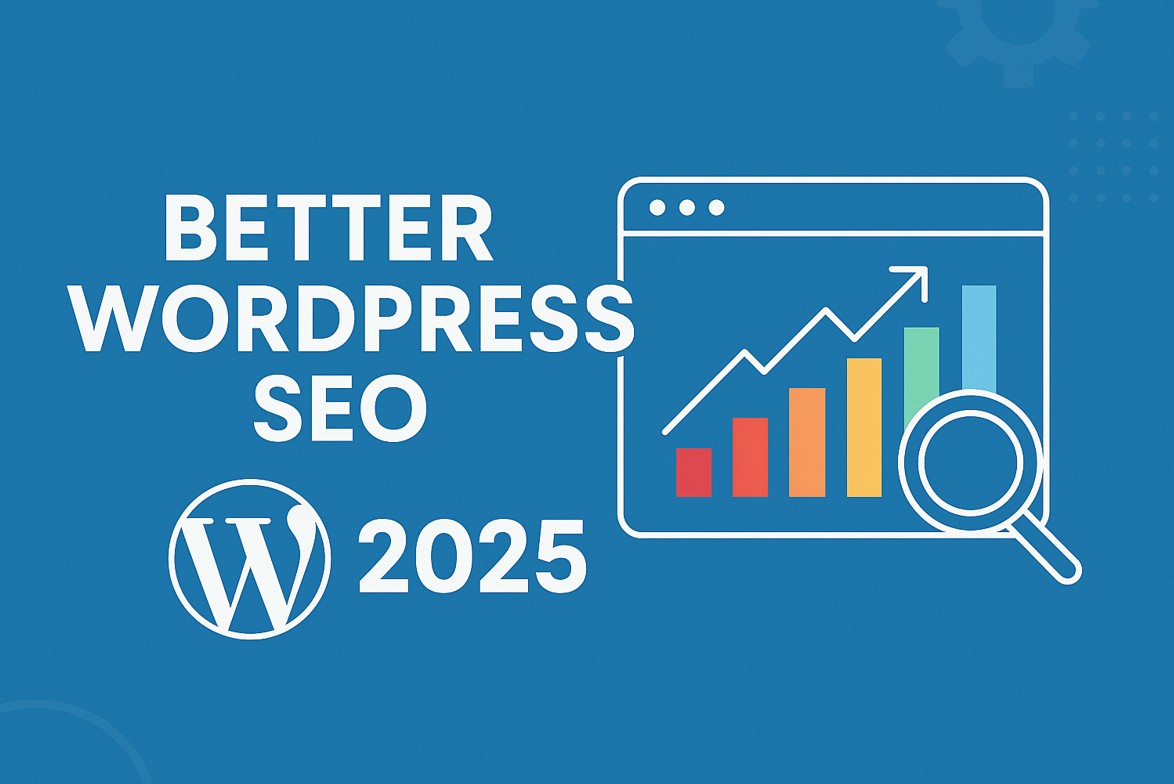WordPress continues to dominate the web as the platform of choice for millions of websites. But with so many sites competing for attention, solid SEO practices are more important than ever. In 2025, optimising your WordPress website isn’t just about plugging in a few keywords or installing a plugin. It’s about taking a holistic, user-first approach while still keeping search engine algorithms in mind. This guide walks you through the essential steps for better WordPress SEO in 2025.
1. Build a Strong SEO Foundation
SEO success starts with the basics. Ensure your WordPress site is technically sound before you focus on content or link building.
- Choose a reliable hosting provider. A fast, secure hosting service improves loading speeds and uptime, both important ranking factors.
- Use an SEO-friendly WordPress theme. Look for lightweight, mobile-responsive themes that load quickly and are accessible.
- Install a trusted SEO plugin. While there are many options, the key is to choose one that simplifies tasks like creating sitemaps, managing meta tags, and optimising content.
2. Focus on Core Web Vitals
Google’s Core Web Vitals — a set of metrics related to page speed, responsiveness, and visual stability — continue to be a significant ranking factor.
- Largest Contentful Paint (LCP): Keep load times under 2.5 seconds.
- First Input Delay (FID): Ensure quick interaction times.
- Cumulative Layout Shift (CLS): Maintain visual stability as the page loads.
Optimise images, minify CSS and JavaScript files, and implement lazy loading to meet these standards.
3. Create High-Quality, Authoritative Content
Content remains king, but not just any content — it needs to be useful, relevant, and trustworthy.
- Prioritise user intent. Understand what your audience is searching for and provide direct, valuable answers.
- Incorporate expertise. Where appropriate, highlight the credentials of content creators to build trust.
- Use a clear structure. Headings (H1, H2, H3) not only improve readability but also help search engines understand your content hierarchy.
In 2025, AI-generated content is on the rise, but search engines still reward human creativity and original insights.
4. Optimise On-Page Elements
Don’t overlook the small details that make a big difference:
- Title Tags: Keep them compelling and under 60 characters.
- Meta Descriptions: Write enticing summaries under 160 characters.
- URL Structures: Keep URLs short, descriptive, and keyword-rich.
- Image Optimisation: Use descriptive alt text and compress images for faster load times.
Internal linking also plays a critical role in SEO, guiding both users and search engines to your most important pages.
5. Strengthen Mobile Optimisation
With mobile-first indexing now the standard, your WordPress site must perform flawlessly on smartphones and tablets.
- Responsive Design: Ensure your theme adjusts seamlessly to different screen sizes.
- Clickable Elements: Buttons and links should be easily tappable.
- Mobile Speed: Focus on accelerating mobile load times with AMP (Accelerated Mobile Pages) where appropriate.
6. Master Structured Data and Schema Markup
Structured data helps search engines better understand your content and can enhance your listings with rich results.
Use schema markup for:
- Articles
- Events
- FAQs
- Products
- Reviews
Many SEO plugins help automate schema integration, but custom implementations can provide even more control and benefit.
7. Strengthen Your Site Architecture
Logical, clear site architecture benefits both users and crawlers.
- Flat Site Structure: Minimise the number of clicks needed to reach important pages.
- Breadcrumb Navigation: Implement breadcrumbs to improve user navigation and provide additional internal links.
- XML Sitemap: Keep your sitemap updated and submit it to Google Search Console.
Clear architecture not only boosts SEO but also enhances the user experience, keeping visitors on your site longer.
8. Focus on E-E-A-T Principles
In 2025, Experience, Expertise, Authoritativeness, and Trustworthiness (E-E-A-T) are vital for SEO success.
- Author Bios: Include bios for content creators with credentials and experience.
- Citations: Link to credible sources to back up claims.
- Secure Site: Implement HTTPS and highlight privacy policies to show users their data is safe.
Building a reputation for trustworthy, authoritative content can set your site apart in competitive niches.
9. Leverage Video and Visual Content
Visual content isn’t just more engaging — it’s also a powerful SEO tool.
- Embed videos: Host informative videos on your site to improve dwell time.
- Optimise video metadata: Include accurate titles, descriptions, and transcripts.
- Use infographics: Shareable graphics can earn backlinks and social shares.
Videos and visuals not only attract more users but also diversify the types of search results you can appear in.
10. Consistently Monitor and Improve
SEO is an ongoing process. Regularly monitor your site’s performance and adjust your strategy accordingly.
- Google Search Console: Track indexing status, keyword rankings, and performance metrics.
- Google Analytics: Understand user behavior and identify top-performing pages.
- SEO Audits: Conduct periodic technical audits to fix errors and seize new opportunities.
Staying agile and data-driven ensures your WordPress site remains competitive as search trends evolve.
Why Partner with Algo Digital for Your WordPress SEO?
At Algo Digital, we know that navigating SEO can feel overwhelming — especially when algorithms, user expectations, and technologies are constantly changing. Our team, based in London, specialises in technical SEO audits, content optimisation, and complete SEO strategies tailored specifically for WordPress websites.
We combine a friendly, hands-on approach with deep expertise to help your site rank higher, drive more traffic, and grow your business. Whether you’re a blogger, an e-commerce brand, or a local service provider, we can create a clear, actionable plan that matches your goals.
Let us take the guesswork out of SEO so you can focus on what you do best. Contact Algo Digital today to find out how we can help your WordPress site shine in 2025 and beyond!




